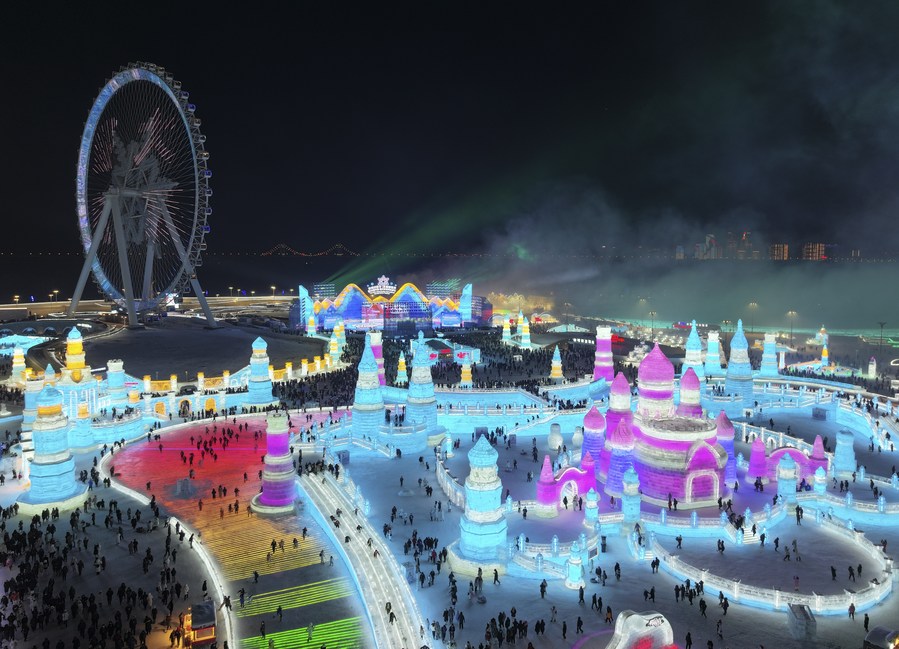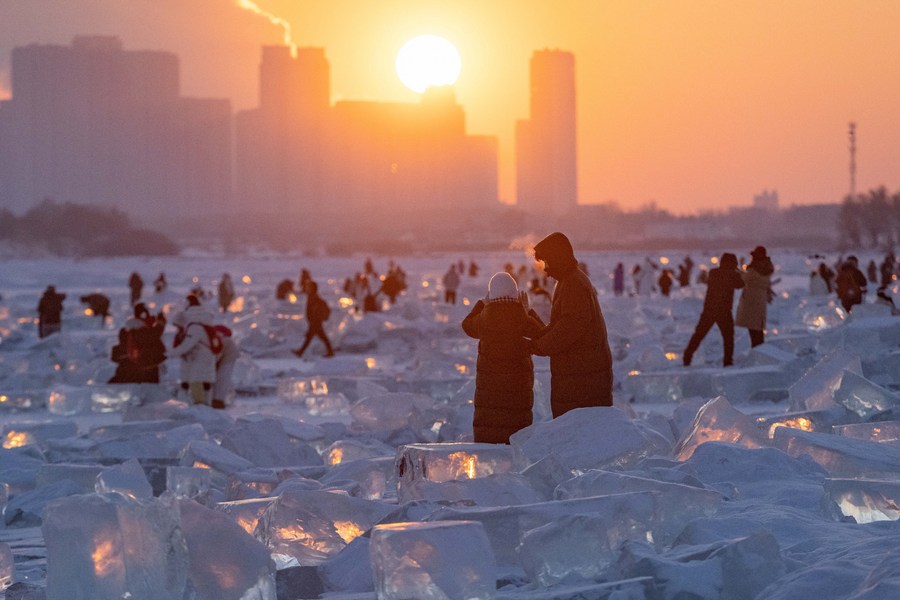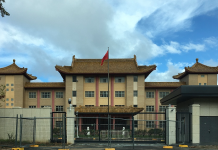
HARBIN: As the night unfolded amidst the radiant moonlight, visitors flocked to Harbin Ice-Snow World, a captivating dreamscape illuminated by dazzling lights and adorned with majestic ice sculptures, transforming the “ice city” into a vibrant tourism hotspot amid China’s winter travel spree.
The capital of China’s northernmost province of Heilongjiang, Harbin is renowned as the “crown jewel of ice and snow” in the country.
The city has emerged as one of the top tourist destinations this winter. During this year’s three-day New Year holiday, it received some 3.05 million tourists, a record high, raking in a tourism revenue of 5.91 billion yuan (about 831.75 million U.S. dollars).
With winter tourism injecting a robust momentum into the local economy, numerous global players are drawn to the snowy province, capitalizing on new opportunities amid the prevailing enthusiasm for ice and snow tours.
Braving freezing temperatures, throngs of winter tourists are providing a significant boost to the hotel industry. Expressing delight at the thriving hotel business, Pierre G. Chidiac, general manager of Sofitel Harbin, said there’s been a remarkable surge in passenger numbers at both the airport and train stations.
Sofitel Harbin is operated by the leading French hospitality group Accor, boasting over 5,100 branded hotels in more than 100 countries and regions globally.
Having initially worked in Harbin from 2008 to 2011, Chidiac shared his enduring fascination with the charm of Harbin Ice-Snow World and the city’s Central Street renowned for its diverse European-style architecture. He said that upon his return to Harbin in May 2023, he observed the enduring economic vitality of this familiar locale.
According to Chidiac, modern travelers are increasingly inclined towards adventurous journeys, with many challenging winter activities gaining popularity. A considerable number of tourists are not only visiting traditional attractions but also actively participating in various ice and snow activities along the Songhua River. Some even venture to Yabuli’s ski resorts or the “Snow Town” in Mudanjiang City for further exploration, he noted.
The French hotelier is confident that these winter “adventure” journeys will increasingly attract international tourists and businesses to Harbin, making ice and snow tourism a powerful driver of economic development.
“We have noticed that Harbin is becoming a more and more popular tourism destination. The amazing winters with ice and snow activities, the comfortable summers, the beautiful nature along the Songhua River, delicious local snacks and the rich culture are among many reasons for me to believe in prosperous tourism,” he added.

Tourists are seen at an ice amusement spot at sunset on the Songhuajiang River Harbin section in Harbin, northeast China’s Heilongjiang Province, Jan. 7, 2024. (Xinhua/Xie Jianfei)
According to Dai Bin, President of the China Tourism Academy, the spillover effect of ice and snow tourism consumption can serve as an important catalyst for local catering, retail, performance and other service industries. This, in turn, promotes investments in scenic spots, resorts and shopping areas, as well as research and development involving equipment and gear, thereby, boosting the local economy, Dai stated.
Additionally, governments at all levels in China, along with the general public, are actively striving to cultivate a conducive business environment for economic development, which will make the country’s vast winter tourism market an unrivaled magnet for global businesses.
During this winter season, Harbin’s tourist-friendly initiatives, such as customized tourist maps, complimentary ginger tea with brown sugar, and non-slip mats in underground passages, have gained popularity on the internet. Beyond the surge in Harbin’s ice and snow economy, the city is showcasing a “new image” of its development to a global audience.
“From the reindeer on Central Street to the artificial moon hanging over the city square, these landscapes have been tailored to the visitor’s expectations, making their trip worthwhile in every aspect,” said Ye Fei, president and CEO of Michelin China. The senior executive added that a customer-centered tourism environment and a well-developed public service system became major drivers of Harbin’s ice and snow economy, which also offered valuable experiences for other regions.
The thriving ice and snow tourism in Harbin has not only showcased the robust vitality of China’s economy but also instilled confidence in Michelin and other international enterprises operating in the Chinese market, Ye said.
Harbin Ice-Snow World, built on the northern bank of the Songhua River which flows through the city, covers a record-breaking area of 810,000 square meters this winter. The French company supported the construction of ice sculptures depicting the “Temple of Heaven” and the “Notre Dame Cathedral” to promote cultural dialogue and exchanges between China and France.
“We plan to launch a series of food festivals in more Chinese cities, bringing high-quality French agricultural products, wines and more to Chinese consumers,” he added. –Xinhua





